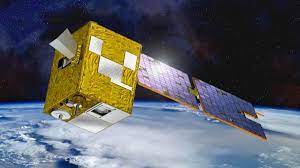The launch of Côte d’Ivoire‘s first observation satellite is scheduled for the month of August 2024.
According to Adama Diawara, the country’s Minister of Scientific Research, the government is collaborating with Universal Konstructors Associated (UKA) and a polytechnic institute to launch the Yam-Sat CI 01, which will be the nation’s first satellite
“With our own satellite, we will be able to better observe the advance of terrorists, map the extent of deforestation, detect illegal gold mining, or even facilitate access to drinking water,” said UKA President Boubacar Fofana.
Read also: Smart Africa opens the first Digital Skills Academy in Côte d’Ivoire
African satellites circling the globe
The launch of the satellite is helping to contribute to a trend that is seeing African nations moving towards increased scientific innovation and the development of space programmes.
With the launch of Yam-Sat CI 01, Côte d’Ivoire has joined the ranks of other African nations that have observation satellites operating in orbit. These nations include Kenya, Zimbabwe, Uganda, Egypt, and Angola, all of which have previously launched satellites.
Egypt was the first African country to launch a satellite into orbit in the year 1998; it was followed by Kenya, which launched its initial experimental nano-satellite from the International Orbit Station in the year 2018.
According to Space In Africa, as of the year 2022, at least 13 African nations had constructed a total of 48 satellites, and 50 African satellites had been successfully launched into orbit.
OneWeb, a global provider of telecommunications and satellite services, expanded its footprint in Africa in November 2022 by announcing three separate collaboration partnerships with the companies Airtel Africa, Q-KON Africa, and the Paratus Group in Angola.
OneWeb and Airtel Africa have entered into a distribution collaboration for the purpose of providing high-speed, low-latency low-Earth orbit (LEO) connectivity services to government and enterprise business clients located over large portions of the African continent.
Thereafter, OneWeb made the announcement that it had reached an agreement with Paratus Group in Angola to construct a satellite gateway in Luanda, the country’s capital.
The launch that is planned for Côte d’Ivoire will occur after the first two SES O3b mPOWER satellites have been successfully deployed into orbit on a SpaceX Falcon 9 rocket that lifted off from Cape Canaveral Space Force Station in Florida in the month of December 2022.
SES will be able to better meet the existing and future connectivity requirements of governments, mobile network operators, energy firms, cruise lines, and businesses across Africa with the assistance of O3b mPOWER.
A worldwide commercial spaceport was planned to be built in the Obock Region in northern Djibouti, and in January 2023, the government of Djibouti signed an agreement with the Hong Kong Aerospace Technology Group (HKATG) to that effect, which was worth one billion dollars.
NAMA, NIGCOMSAT Collaborate to broaden Satellite-Based Navigation System
Côte d’Ivoire 2030’s Strategic Plans
In order to speed up the process of inclusive and sustainable development over the decade that spans from 2020 to 2030, Côte d’Ivoire aims to intensify the structural transformation of its economy as well as the cultural change of its institutions and governance. In order to successfully identify and express what needs to be done,
Since July 2018, the Ivorian government has been hard at work on a significant work programme to establish a Strategic Plan that will be dubbed “Côte d’Ivoire 2030” (CI2030). This plan will include strategies and programmes for accomplishing this aim.
This Plan is a document that outlines a long-term vision and serves as a reference framework for the actions taken by the entire government, as well as for the partnership and policy discussion that the government engages in with its domestic and international partners, as well as with all of the most important state-holders and components of Ivorian society.
In addition to serving as a long-term vision document, CI2030 aims to both facilitate the accomplishment of the Sustainable Development Goals (SDGs) by the year 2030 and to inform the strategic decisions and priority programmes of the operational five-year national development plans (NDP 2021-25 and NDP 2026-2030).
These plans are designed to run from 2021 to 2030.
“Côte d’Ivoire 2030” is a plan that makes use of the knowledge gained not only from the brief history of the country, which spans the years 1960 to 2020, but also from the experiences of other nations that have undergone significant change since the 1960s.
The Ivorian government was able to determine the primary development policy options that are most suited to the existing situation in the country with the assistance of this process of self-evaluation and analysis of ‘cross-country’ data.




